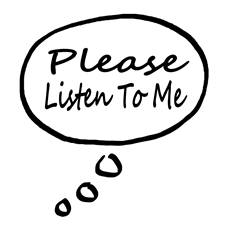
As you may know, listening is considered to be the most important communication skill, and it is also the most frequently-used communication skill. Unfortunately, it’s also the one at which most of us are the least efficient and about which there are numerous misconceptions.
For example, a lot of people are under the misconception that they are very good listeners when, in fact, they are far from it! The reason for this mistaken belief is simply that a poor listener doesn’t realize what they’re missing!
In addition, good listening should not be confused with having a good memory. If someone does not remember what we tell them it may not be due to the fact they are poor listeners. Some people are unable to retain information over time, despite having listened attentively to those who shared the information with them. In fact, we’ve seen data indicating that, on average, within two days of a conversation we “forget” nearly 75% of what others have said.
Similarly, listening should not be confused with “hearing.” Hearing is something we can do without thinking, as in hearing background music or the sounds of traffic while we work or drive. Listening, on the other hand, involves comprehension; attentive listening can also have an impact on our audience because others can observe the fact we’re listening to them and they tend to react with positive feelings about us as well as about themselves (i.e., they feel important or that their message is being deemed as important).
Listening “Do’s & Don’ts”
Fortunately there are a number of things we can do (or not do) to improve our ability and capacity to listen:
- Don’t talk as much. While this might seem obvious, consider that it is nearly impossible to listen if we are speaking! Though it may not improve our listening skills, making an intentional effort to talk less is a good first step to improving our capacity to listen. One method for accomplishing this is to set a target Talk/Listen ratio as part of your plan for meetings or important conversations.
- Don’t interrupt. We all have a tendency to refute what others say. In fact, this “rebuttal tendency” has been identified as one of the most common barriers to good listening because as soon we shift our focus away from what others are saying and instead think about how we will argue with it, we have compromised our ability to listen.
- Ask more open-ended questions (i.e., those that require more than a simple one-word response). This can help us to talk less because the open-ended structure of our questions will be prompting others to speak more.
- Use what is said in conversations — clarify (with questions), respond to, or build on what’s others say.
- Create a written plan for meetings and important conversations; include a list of objectives as well as a few questions you’ll ask and statements you might make; this significantly increases our capacity to listen because in reduces distraction. We can’t listen well if we are distracted; and the most common distraction involves shifting our focus away from what others are saying and instead thinking what WE will say or ask next. If we have a written plan this distraction is largely eliminated.
- Maintain eye contact during face-to-face conversations. Studies show that our ability to both listen and comprehend increases significantly when we do so.
- Take notes during meetings and important conversations (if possible) — this enables us to “listen” with not only our ears, but also our sense of touch and vision. It also makes it easier to avoid distractions and helps with the above-referenced after-the-fact “memory” lapses. However, if we get too detailed in our note taking it can negatively impact our capacity to listen. Instead, the notes taken should be “high-level” only. Our goal is to capture key points that others are making as opposed to taking “meeting minutes.”